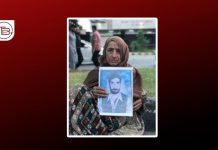The Pashtun people on both sides of the Durand Line have been caught in the grip of war for decades, and their land has been the battleground for global powers, a price the Pashtun nation has paid in the form of genocide and displacement. After the Saur/Sowr Revolution, the Cold War front shifted to Pashtun lands, where, for ten years, Western countries’ proxy organisations ravaged Pashtun territory while fighting the Soviet Union’s forces. The war that began in the 1970s continues today in different forms.
Since the second decade of the 21st century, the youth of Pashtun lands have raised their voices against war and for national rights. After decades of oppression, Pashtun youth, under the banner of the Pashtun Tahafuz Movement (PTM), began a peaceful struggle to prevent their land from being a battleground for global conflicts. By raising the flag of peace, they laid the foundation of a non-violent movement. However, the state of Pakistan has continued its efforts to suppress this peaceful movement with force, even though it calls for peace.
The PTM adopted a peaceful political approach, spreading its message across Pashtun lands through sit-ins and public gatherings. However, even this peaceful movement was intolerable to the state. For eight years, a cycle of arrests, enforced disappearances, and martyrdoms has continued, and now the PTM has been banned to prevent it from participating in the ‘Pashtun National Gathering’. This is seen as an attempt to stop the Pashtun people from uniting against war and crush their struggle.
The same state policies that were tested to suppress Baloch political resistance are now being applied to the Pashtun nation. By arresting, disappearing, and killing political activists, the state is attempting to block the ‘Pashtun National Gathering’. This makes it clear that peaceful political avenues are being closed for oppressed nations. However, no nation has ever abandoned its political struggle due to oppression, and it is unlikely that they will now.






























